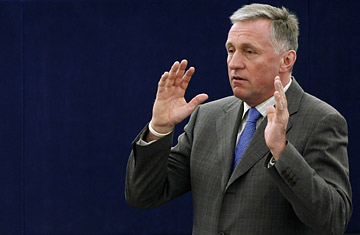
Czech Prime Minister Mirek Topolanek addresses the European Parliament in Strasbourg
One vote was all it took to bring down the Czech government. By the slimmest of majorities, 101 out of 200, the Czech parliament backed a no-confidence motion against Prime Minister Mirek Topolanek's fragile center-right coalition government on Tuesday night.
The vote followed accusations that one of Topolanek's aides had tried to pressure the Czech public television broadcaster to drop a program criticizing a former member of the opposition Social Democrats who had decided to back the coalition. But the toppling of Topolanek is not just a Czech issue. With the Czechs currently holding the presidency of the European Union, the consequences of this vote could resound far beyond Prague and deep into Brussels. (See pictures of Prague.)
Under E.U. rules, all meetings of the 27 members — from the summits of leaders to technical gatherings of civil servants — are chaired by the country holding the reins. The collapse of the Czech coalition means that many of the ministers and officials directing the E.U.'s work could be replaced midway through the country's six-month presidency, which started in January.
For example, when Barack Obama arrives in Europe next week for key summits in London and Prague, who will be there to greet him on behalf of the E.U.? And what happens to negotiations on pressing E.U. issues, everything from reforming Europe's financial markets and clamping down on tax havens to climate change pledges and immigration rules? (See pictures of the world reacting to Obama's win.)
Topolanek told the European Parliament on Wednesday that his departure would have "no impact" on the E.U. presidency. But he also warned that it could complicate negotiations. "Partners in Europe have grown used to us negotiating hard," he said. "In this sense it can happen that our position will be weakened."
He is expected to hold onto the reins of both the government and the E.U. presidency until a new Czech coalition is formed, but there is uncertainty about how long this could take. Social Democrat leader Jiri Paroubek has said the government could "complete the Czech E.U. presidency or its substantial part."
Topolanek says he does not want to maintain a caretaker government until June, when Sweden takes over the E.U. presidency. If none of the candidates for the new prime minister can secure a majority — a strong possibility in the split Czech parliament — early elections would have to be called, which would mean further distractions for the country supposedly shepherding the E.U. (Read: "'Old Europe' Wary as Czechs Take Over E.U. Presidency.")
The European Commission insists it has "full trust" that the Czech Republic will continue to run the E.U. presidency smoothly. But officials in Brussels are nervous about the E.U. falling into limbo at such a critical moment. On Wednesday, German MEP Martin Schulz, who leads the European Parliament's Socialist group, accused Topolanek of undermining Europe. "Being here this morning shows that you are a fighter, but so far you haven't understood what the task of the presidency of the E.U. is," Schultz said.
Others are more sanguine. "It's not an existential crisis, but it is a nuisance," says Hugo Brady, from the Centre for European Reform, a London-based think tank. "Luckily, there are mechanisms to keep things going. The E.U. is to some extent above politics — although that is part of its problem — and officials can pick up the slack if politicians cannot deliver."
Yet the Czechs were already struggling with their presidency role before the government fell. This was partly due to it being a small country taking on the presidency for the first time, but also to the sheer demands of steering the E.U. through the economic crisis. Unflattering comparisons with last year's activist French presidency — with critics complaining that the Czechs are doing too little — don't help, and French President Nicolas Sarkozy has been curtly dismissive of his successors at the E.U.'s helm. (See pictures of Sarkozy in the U.K.)
Political uncertainty in Prague seems to have added to the unsteady leadership. In Tuesday's vote, Topolanek was defeated by the mainly center-left opposition, but he has also had to cope with sniping from his own president, Vaclav Klaus. Klaus has been outspoken about his criticisms of every aspect of the E.U., even telling the European Parliament last month that it was an elitist project comparable to Soviet-era dictatorships.
Until now, Topolanek could say that Klaus held a mainly figurative position, with few formal powers to disrupt the Czech presidency. But under the Czech constitution, the president has the power to nominate a new prime minister, making him the country's kingmaker — a prospect that does little to raise spirits in Brussels.
The E.U. has been here before. The Italian government fell halfway through its presidency in 1996, while France held two rounds of presidential elections during its 1995 presidency. In those cases, major E.U. decisions had to be suspended during the changeovers. But with the E.U. facing the greatest economic crisis of its half-century existence, many are wondering how much bigger the knock-on effects will be of that one vote in Prague.
